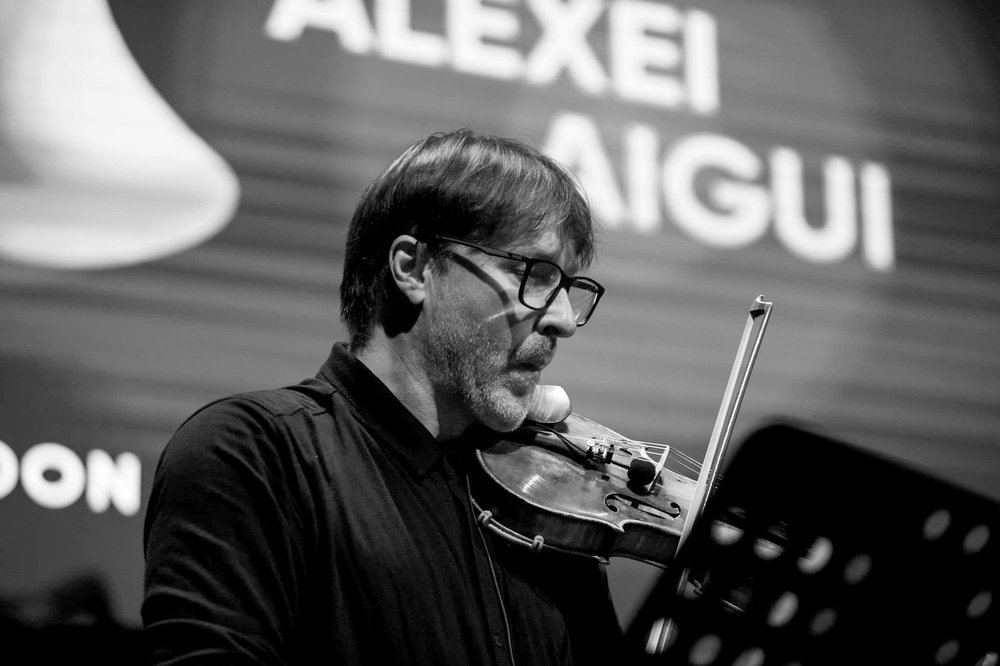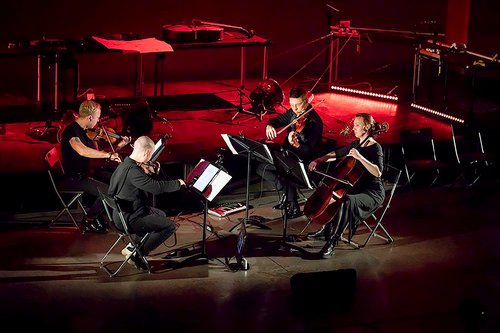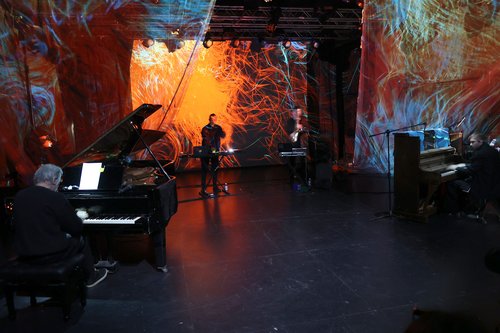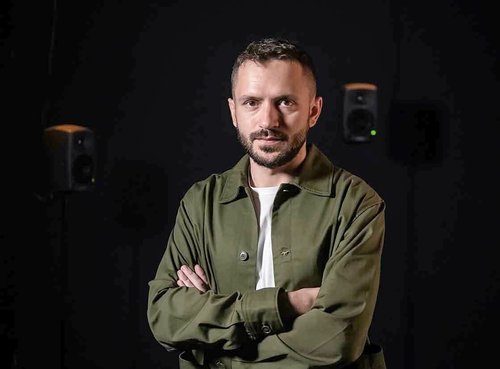Alexei Aigui and the Impossible Architecture of Sound

Alexei Aigui. #MusicSavesTheWorld performance. London, 2024. Photo Credits: Tania Naiden, Valya Korabelnikova
A composer of ‘simple music’, yet complex to perform, founder of the groundbreaking 4’33’’ ensemble, and a virtuoso violinist for whom the solo violin represents an exquisite torment, Alexei Aigui has recently graced London’s #MusicSavesTheWorld marathon with a string quartet performance.
Aigui’s stay in London was brief; we could not meet before the concert, as there was only time for one rehearsal with the local musicians who received their scores in advance. “Explaining my music to unfamiliar performers is incredibly stressful,” Aigui confesses, “I usually just ask them to play rhythmically and cleanly. Here, my work flirts with minimalism: even the subtlest rhythmic pattern requires precision.” His performative style has become legendary: characteristic leaps on stage, violin in hand, serving as visceral conductorial cues for often dramatic shifts to the next part of a piece or ‘tutti’ commands to his fellow musicians, have become as much Aigui’s trademark as his marathon improvisations, which can make up to 80% of a concert program. Never relying on sight-reading, he treats music as a changeable force, the very breath of matter.
We meet after the London concert and Aigui opens our conversation by likening himself to the Terminator, a character capable of processing myriad sound streams: “I’m constantly bombarded by noises. This cacophony is my cross to bear. Fortunately, sounds are gloriously abstract, open to infinite interpretation. Each listener constructs their own unique auditory landscapes when experiencing music. We are all related, whether sounds, animals, or humans.”
Born in 1971 in Moscow, Aigui hailed from an artistic crucible. His father, Gennady Aigui (1934–2006), a Chuvash avant-garde poet, author of the Anthology of Chuvash Poetry, and eventually Commandeur of the Order of Arts and Letters, cultivated a home that was a nexus for Moscow’s nonconformists, including Vladimir Yakovlev (1934–1998), Igor Voroshilov (1939–1989), and Anatoly Zverev (1931–1986): canvases spilled out from everywhere, they were even tucked under sofas. “I spent my childhood beside a monumental painting by Igor Vulokh, an artist as remarkable as Rothko,” Aigui recalls, hinting at the profound impact of growing up immersed in enigmatic abstraction during the Soviet era.
Graceful structures in Aigui’s musical universe, those gossamer-thin architectures of sound, have an ethereal quality to radiate inner luminescence, despite, or perhaps because of, their ostensible simplicity. In some manifestations, his compositions evoke the unbridled spirit of gypsy wedding celebrations. Acknowledging that many of his most successful pieces of music were accidental, the composer recalls: “During perestroika, my mother took a job at a gas station to buy me my first violin – now that, I suspect, was no coincidence…”
Though a graduate of the State Music and Pedagogical Institute, Aigui discovered his true muse not within the halls of academia, but in the electrifying energy of King Crimson and the progressive rock scene. In 1994, he founded 4’33’’, an ensemble where traditional chamber instruments – trumpet, trombone, cello – collided with the rebellious growl of bass guitar and drums. Though the ensemble’s name references John Cage’s iconic minimalist piece, 4’33’’ unleashed a dense, almost aggressive soundscape from its very inception. “When I play, energy courses through me, maybe I even produce it myself,” Aigui explains. Drawing a parallel with Morton Feldman’s (1926–1987) work, “utterly static, yet equally sublime”, he posits that aesthetic criteria are fundamentally conditional, always in flux. “But when I play Aigui, it sounds like Aigui,” he reflects on Sviatoslav Richter’s (1915–1997) famous quip that I recalled: “I play Mozart as if it were Haydn and out comes Schumann.”
The trajectory of Aigui’s creative odyssey is linked to the evolution of Moscow’s alternative scene. The ‘Dom’ Cultural Center, a sanctuary for jazz and experimental music, witnessed 4’33’’ ascend to resident status and hosted Aigui’s sole encounter with Sergey Kuryokhin (1954–1996), the legendary Pop-Mekhanika provocateur. Two decades later, Aigui would painstakingly transcribe Kuryokhin’s audio-only legacy for a performance at the Great Hall in the Tchaikovsky Conservatory. Kuryokhin’s most famous composition, ‘Donna Anna’, dubbed as ‘Hare Krishna Donna Anna’ by its creator, emerged as the triumphant centrepiece of this concert.
In 2004, 4’33’’ appeared on the stage of the inaugural Usadba Jazz festival in Moscow a key event in Russia’s contemporary music scene. Its founder and president, Maria Semushkina (b.1977), now spearheads #MusicSavesTheWorld, a platform which unites musicians displaced by political turbulence. Since 2022, this initiative has facilitated concerts across Tbilisi, Yerevan, Kotor, and London, bringing together over one hundred artists from Russia, Ukraine, Belarus, Cameroon, Georgia, Armenia, and Israel. Prior to Aigui’s London #MusicSavesTheWorld performance, Semushkina, in a moment of unrestrained admiration, crowned him as ‘the greatest Russian composer.’
The material Aigui uses in his work is a thesaurus of world music. For a decade, he collaborated with German pianist Dietmar Bonnen (b.1958), engaging in a reinterpretation of modern legends such as Kurt Weill, Frank Zappa, and Jimmy Hendrix. “Engaging with personalities fascinates me,” Aigui confides, “I need communion with people, with sounds. Even the faintest impulse such as the lingering tone of a bell or a spontaneous rhythm provides sufficient provocation for me. A solo violin remains my most exquisite torment.” These sonic experiments have produced arrangements that both honour and transform renowned compositions, yet Aigui’s distinctive violin timbre instantly betrays the performer, making it clear that he is channeling ‘his own music.’
To the broader public, Aigui is primarily a film composer of remarkable versatility. His cinematic debut, ‘Country of the Deaf’ by Vladimir Todorovsky (b.1962), became a manifesto of post-perestroika Russia, earning a Golden Bear nomination at the 1998 Berlinale. Subsequent collaborations with eminent directors such as Vitaly Mansky (b.1963), Kirill Serebrennikov (b.1969) and Vladimir Khotinenko (b.1952) culminated in four Nika awards for Best Original Score. Echoing the path of Soviet composer-dissidents like Alfred Schnittke (1934-1998) and Sofia Gubaidulina (b.1931), who combined work for classical stage and cinema, Aigui expanded his artistic horizons upon leaving Russia, forging connections with Western filmmakers.
Recently, Aigui completed the score for Raoul Peck’s (b.1953) documentary ‘Orwell’, a cinematic exploration of contemporary society where notions of total control, violence, and censorship endure. The composer describes this project as a near-existential experience: “For four months, I was immersed in landscapes of devastation: ruins, corpses, productions of humanity’s most unsavory characters.” The historical footage proved so emotionally charged that the authors opted against exposing the orchestra to the visual material during recording.
Aigui is unfazed by the hesitation amongst some music professionals to acknowledge him as an established composer. For him, experimentation is an organic mode of expression; exploration of conceptual realms has never been his endgame. “Music, I believe, stems from my internal processes,” Aigui says. “I can exist perfectly well without composing - music lives in my head.” So, as the interview draws to a close, I ask him one last question to which I wanted a precise response: “Imagine a starship landing near your house, and an alien emerges, asking you to explain what music is.” After pause for reflection and a quiet murmur, Aigui replies: “I would tell him that the hour is not yet late, and our church is still open. ‘Come,’ I’d say, ‘let me play the violin in pure silence and you’ll understand everything!’ I won’t invite him home though; my place is a mess.”














